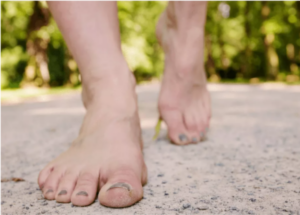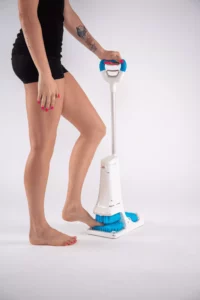Title: Can a Foot Scrubber Help to Reduce Foot Odor?
Introduction:
Foot odor can be an embarrassing and persistent problem, affecting the confidence and comfort of those who suffer from it. It’s a common misconception that foot odor is solely a result of poor hygiene; in reality, it can be caused by a complex interplay of factors, including sweat, bacterial growth, and dead skin cells. This article delves into the efficacy of foot scrubbers in tackling pesky foot odors, examining their role in a comprehensive foot care routine. We will explore the various causes of foot odor, discuss essential foot hygiene practices, and compare different types of foot scrubbers. In addition, we will highlight the importance of antimicrobial agents in foot scrubbers and discuss how exfoliation is instrumental in managing foot odor. By understanding these key aspects, you can determine whether incorporating a foot scrubber into your daily regimen could be the solution to keeping your feet fresh and odor-free.
1. Causes of Foot Odor: Here, we will look at the biological and environmental factors contributing to smelly feet, including the role of sweat glands and bacterial activity.
2. Foot Hygiene Practices: This section will outline the best practices for maintaining foot cleanliness and dryness to prevent odor, emphasizing the importance of routine care.
3. Types of Foot Scrubbers: We will review the variety of foot scrubbers available on the market, from manual pumice stones to electric devices, and discuss how they fit into a foot care routine.
4. Use of Antimicrobial Agents in Foot Scrubbers: In this part, we’ll examine how foot scrubbers infused with antimicrobial agents can combat the bacteria responsible for foot odor.
5. The Role of Exfoliation in Managing Foot Odor: Finally, we will explore how exfoliation, a key function of foot scrubbers, helps to remove dead skin cells that can harbor odor-causing bacteria.
Causes of Foot Odor
Foot odor is a common issue that many people experience, and understanding its causes is the first step towards effectively managing it. The primary cause of foot odor is the sweat produced by the feet, which in itself is usually odorless. However, the environment inside shoes provides a warm, dark, and moist place that is ideal for the growth of bacteria. It’s these bacteria that feed on the sweat, dead skin cells, and other organic material on the feet that lead to the production of the unpleasant odors.
The type of bacteria that cause foot odor are usually those that thrive in moist environments, such as Staphylococcus epidermidis and Bacillus subtilis. In addition to bacteria, fungi, such as those that cause athlete’s foot (tinea pedis), can also contribute to foot odor. The presence of fungal infections can not only lead to a malodorous scent but can also cause itching, burning, and peeling skin, which can exacerbate the issue.
Several factors can increase the likelihood of foot odor developing. Poor foot hygiene, such as not washing feet regularly or thoroughly, can allow bacteria and fungi to flourish. Wearing the same shoes every day without allowing them to dry out can also contribute to the problem, as can wearing shoes that are made of materials that do not allow the feet to breathe. Socks play a role too; synthetic fibers can trap moisture, whereas natural materials like cotton, wool, or bamboo have better moisture-wicking properties.
Interestingly, diet and medication can also influence foot odor. Certain foods and medicines can increase the amount of sweat the body produces or alter its composition, which can affect how much food there is for bacteria to break down into smelly substances.
In summary, foot odor is caused by the interaction between sweat and the bacteria or fungi that reside on the feet and in footwear. Good hygiene practices, proper footwear, and attention to diet and medication can all help to reduce or prevent foot odor.
Foot Hygiene Practices
Foot hygiene practices are essential for maintaining healthy feet and reducing foot odor. Good foot hygiene involves several steps that aim to keep the feet clean, dry, and free from harmful bacteria and fungi that can cause odor and other foot problems. Here are some important foot hygiene practices:
1. **Washing Regularly**: It is imperative to wash your feet every day with soap and water. This simple practice removes dirt, sweat, and bacteria from the skin’s surface. Make sure to clean in between the toes where moisture and bacteria can easily accumulate.
2. **Thorough Drying**: After washing, drying your feet thoroughly is just as important as the washing itself. Moisture between the toes and on the foot’s surface can promote the growth of bacteria and fungi, leading to foot odor and infections.
3. **Moisturizing**: While it is important to keep your feet dry, they also need to be moisturized to prevent the skin from becoming too dry and cracking. Use a foot cream or lotion to keep the skin supple, but avoid applying it between the toes where excess moisture should be avoided.
4. **Changing Socks Regularly**: Wearing clean socks and changing them at least once a day can greatly reduce foot odor. Socks made of moisture-wicking materials are best as they help keep the feet dry.
5. **Wearing Breathable Footwear**: Shoes that allow air circulation can prevent excessive sweating by letting your feet breathe. Avoid wearing the same shoes every day, as they need time to air out.
6. **Using Foot Powders or Deodorants**: These products can help absorb sweat and reduce odor. They can be applied directly to the feet or inside the shoes.
7. **Regular Foot Scrubbing**: Using a foot scrubber can help remove dead skin cells and keep the feet clean. This practice can be particularly useful for preventing odor because it reduces the amount of dead skin that bacteria can feed on.
8. **Keeping Nails Trimmed**: Long toenails can harbor dirt and bacteria, contributing to foot odor. Keeping them trimmed and clean is an important part of foot hygiene.
By integrating these foot hygiene practices into your daily routine, you can help reduce foot odor and keep your feet feeling fresh and healthy. Remember that consistency is key, as foot odor can quickly return if good hygiene is not maintained.
Types of Foot Scrubbers
Foot scrubbers can be an integral part of a foot hygiene routine, and they come in various types, each designed to help maintain clean and odor-free feet. Foot odor is primarily caused by bacteria that thrive in the moist environment of our shoes and feed on the sweat and dead skin cells on our feet. Regular use of foot scrubbers can aid in reducing foot odor by removing the dead skin and other debris that bacteria feed on.
There are several types of foot scrubbers available on the market, each catering to different preferences and needs:
1. **Manual Foot Scrubbers:** These are typically made from materials like pumice stone, metal, plastic, or wood, and require manual effort to scrub the feet. They may have abrasive surfaces that are effective at sloughing away dead skin.
2. **Electric Foot Scrubbers:** These are powered devices that often come with various attachments for exfoliation and massaging the feet. Electric scrubbers can be more effective and less labor-intensive than manual ones.
3. **Shower Foot Scrub Mats:** These mats are placed on the shower floor and have bristles or other textured surfaces. You can clean and exfoliate your feet by simply moving them back and forth on the mat.
4. **Foot Scrub Brushes:** These brushes often have a long handle and are designed to help reach the soles of the feet without bending over too much. The bristles can vary in stiffness, with softer bristles for sensitive skin and stiffer ones for more intense exfoliation.
5. **Loofahs and Sponges:** These are softer options for those who have sensitive skin or prefer a gentler scrub. They need to be replaced regularly to prevent bacterial growth.
Using these foot scrubbers can significantly affect foot health and hygiene. By removing the dead skin cells and keeping the feet clean, they can prevent the accumulation of bacteria that causes foot odor. It is important to choose a foot scrubber that suits your skin type and to use it regularly as part of your foot care routine. Additionally, it is also crucial to clean and dry the foot scrubber after each use to prevent it from becoming a breeding ground for bacteria. Remember to follow up with a moisturizer to keep your feet hydrated after exfoliation.
Use of Antimicrobial Agents in Foot Scrubbers
The use of antimicrobial agents in foot scrubbers is a significant subtopic when discussing the reduction of foot odor. Foot odor is often caused by the bacteria that thrive in the moist, warm environment of shoes and socks. These bacteria break down sweat and dead skin cells, leading to the unpleasant smell commonly associated with foot odor.
Antimicrobial agents, which are substances that kill or slow the growth of microorganisms including bacteria, fungi, and viruses, can be an effective addition to foot scrubbers. By incorporating antimicrobial properties into the materials of foot scrubbers, manufacturers can provide a dual-action tool that not only physically exfoliates dead skin and debris from the feet but also chemically combats the microorganisms responsible for odor.
There are various types of antimicrobial agents that could be used in foot scrubbers, such as metal ions like silver and copper, which have natural antimicrobial properties. Other chemical agents might include triclosan or benzalkonium chloride, although the use of such chemicals is subject to regulatory approval and consumer safety considerations.
The introduction of antimicrobial agents into foot scrubbers can significantly enhance the overall hygiene of the feet. By reducing the microbial load, these scrubbers can help prevent the proliferation of odor-causing bacteria. However, it is important to note that while antimicrobial agents can be effective, they should be used as part of a broader foot care routine that includes proper washing, drying, and changing socks regularly to maintain foot health and freshness.
Consumers should also be aware of the potential environmental impacts of certain antimicrobial agents, as some may contribute to antibiotic resistance or environmental pollution. Therefore, selecting foot scrubbers with safe and environmentally friendly antimicrobial properties is crucial. Additionally, those with sensitive skin should consult with a healthcare provider before using products with antimicrobial agents to avoid any adverse reactions.
The Role of Exfoliation in Managing Foot Odor
Exfoliation plays a crucial role in managing foot odor, acting as a preventative and remedial measure. The skin on our feet is usually under a lot of stress due to constant weight-bearing and often being confined within shoes. This environment can lead to a buildup of sweat and dead skin cells, which can create a breeding ground for bacteria – the typical culprits behind unpleasant foot odor.
The process of exfoliation involves removing the outermost layer of dead skin cells. This can be done using various methods, including mechanical scrubbers, chemical peels, or exfoliating creams and lotions that contain abrasive particles. When it comes to foot care, mechanical exfoliation with a foot scrubber is especially popular. It is a simple and effective way to maintain soft, clean, and odor-free feet.
By exfoliating the feet regularly, individuals can reduce the accumulation of dead skin cells that can harbor bacteria. This helps to minimize the bacterial load on the skin’s surface, which, in turn, reduces the likelihood of foot odor. Moreover, exfoliation can improve the effectiveness of other foot care products, like moisturizers and antimicrobial creams, by allowing them to penetrate deeper into the skin.
Aside from its direct benefits in reducing foot odor, exfoliation can also help prevent the formation of calluses and corns, which can further contribute to skin irritation and odor if left untreated. It promotes a healthier skin environment and improves blood circulation to the feet, thereby enhancing overall foot health.
In conclusion, incorporating exfoliation into your foot care routine can be a powerful tool in combating foot odor. Not only does it help in keeping the feet clean and free from odor-causing bacteria, but it also encourages healthier skin and contributes to the overall well-being of your feet. Regular exfoliation, when combined with proper foot hygiene and the use of appropriate footwear, can lead to fresher, odor-free feet.




